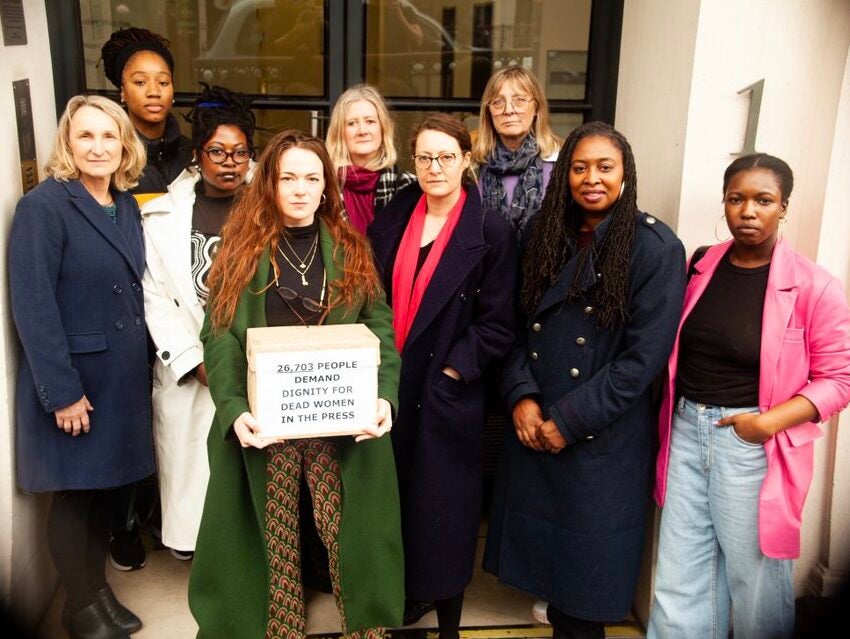
A voluntary approach to improving sensitivity around reporting of domestic abuse stories in UK newsrooms is no longer enough, according to a group of feminist campaigners.
The campaign group Level Up, supported by Labour MP Dawn Butler, has delivered a petition signed by more than 26,000 people to the offices of press regulator IPSO calling for a change to the Editors’ Code of Practice.
They want a specific clause in the code governing best practice on the reporting of domestic abuse killings so that regulated publishers are held to a specific standard.
IPSO and rival press regulator Impress endorsed Level Up’s Dignity for Dead Women guidelines on the reporting of domestic abuse deaths four years ago but the campaigners feel although progress has been made, this voluntary approach to improvement – which has seen them conduct training with newsrooms – is no longer enough.
This was demonstrated, they feel, by the recent coverage of the killing of headteacher Emma Pattison and her daughter Lettie by their husband and father George.
One headline about their deaths previously criticised by Butler in the Commons read: “Did living in the shadow of his high-achieving wife lead to the unthinkable tragedy?” Butler called for a legally enforceable Editors’ Code with a clause for reporting on fatal domestic abuse, arguing: “The way the press reports domestic abuse is often inaccurate, undignified and sensationalises headlines over responsible reporting.”
Level Up shared a statement from one woman whose sister was killed by her ex-partner. She said: “What goes on the internet stays on the internet for the generations to come. Victim-blaming headlines and articles show a woeful lack of understanding in domestic abuse and homicides.
“Perpetuation of domestic abuse myths and the clickbait that follows only serve to deepen the wounds of traumatic loss.”
Level Up co-director Janey Starling said there should be “strong press regulation” on domestic abuse in the same way there is around suicide reporting as both are public health issues.
Clause 5 states: “When reporting suicide, to prevent simulative acts, care should be taken to avoid excessive detail of the method used, while taking into account the media’s right to report legal proceedings.”
Although the petition was delivered by IPSO, the consultation on the code is being carried out by the independent Editors’ Code Committee. IPSO was, however, “welcoming” of the discussions raised.
Jane Debois, IPSO’s head of standards and regulation, said: “The reporting of domestic abuse is an important area for editors and journalists to consider carefully. We have been active in promoting standards in this area of journalism, including working with Level Up and other interest groups. We helped Level Up develop guidelines and training for the media on fatal domestic abuse.
“Our guidance and resources are produced through our engagement and work with expert organisations. Last year, we produced information for the public on the reporting of domestic abuse. We are currently developing information for survivors and their families on how IPSO can help, in a similar format to our information for survivors and victims of sexual violence. We will continue to work with different groups to inform our resources.
“We believe it is vitally important that survivors, victims, their families and organisations working to support them, are aware of the services we offer that may be of support, including our complaints process and how we can help with potential press intrusion. It is also crucial that we listen to and are informed by their experiences.
“We welcome the engagement by Level Up and all of those who signed the petition as part of the consultation on the Editors’ Code of Practice. We are passing the petition on to the Editors’ Code Committee who are carrying out the consultation.”
The Editors’ Code of Practice Committee’s latest consultation closed at the end of March. It holds consultations every three years – the last one resulted in the addition of a provision over mental health to the privacy clause. The code of Practice Committee invites possible amendments to the code on an ongoing basis.
Email pged@pressgazette.co.uk to point out mistakes, provide story tips or send in a letter for publication on our "Letters Page" blog
